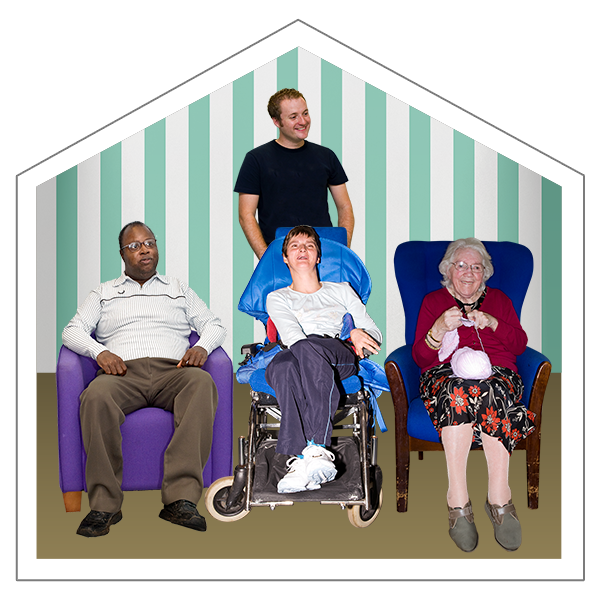-
Nearly nine in ten people with a learning disability
 A learning disability is to do with the way someone's brain works. It makes it harder for someone to learn, understand or do things.
have still not have all their
social care
A learning disability is to do with the way someone's brain works. It makes it harder for someone to learn, understand or do things.
have still not have all their
social care
 Social care means the services that give care and support to people who need it.
support reinstated, according to new Mencap
survey
Social care means the services that give care and support to people who need it.
support reinstated, according to new Mencap
survey
 A survey is when someone asks you to answer some questions.
to mark eight months since the first lockdown [1].
A survey is when someone asks you to answer some questions.
to mark eight months since the first lockdown [1]. -
Almost three quarters of family carers surveyed are worried that there are more cuts
 Cuts are when there is less money to pay for things like clubs and support.
to care packages to come, [2] with some reporting that their
local authority
Cuts are when there is less money to pay for things like clubs and support.
to care packages to come, [2] with some reporting that their
local authority
 A local authority is also called a
council
A local authority is also called a
council
 A council is also called a local authority. They are a group of people who make decisions about some of the things in the area where you live. These include: schools, social care (support for people), parks and dustbin collection.
. They are a group of people who make decisions about some of the things in the area where you live like schools, social care (support for people), parks and dustbin collection.
is already trying to cut their loved ones’ care package further.
A council is also called a local authority. They are a group of people who make decisions about some of the things in the area where you live. These include: schools, social care (support for people), parks and dustbin collection.
. They are a group of people who make decisions about some of the things in the area where you live like schools, social care (support for people), parks and dustbin collection.
is already trying to cut their loved ones’ care package further. -
Mencap is calling on the Government
 The Government are the people who run the country. The Government decide how much tax people should pay and how things like the National Health Service (NHS) should work.
to provide at least £3.2 billion in emergency funding for social care in its forthcoming spending review.
The Government are the people who run the country. The Government decide how much tax people should pay and how things like the National Health Service (NHS) should work.
to provide at least £3.2 billion in emergency funding for social care in its forthcoming spending review.
A staggering 87% of people with a learning disability who had their social care cut have still have not had all their support reinstated eight months on from the first lockdown, according to a survey of family carers by the learning disability charity, Mencap.
The survey also found that a third (32%) of people with a learning disability who usually receive social care support continue to struggle without any support at a time when they need it most, leaving them and their families at crisis point during the second lockdown.
The charity asked 410 people across the UK about their experiences of caring for someone with a learning disability during the second lockdown. This followed a survey of 1069 family carers this summer, which revealed that cuts to social care during the coronavirus pandemic had left people with a learning disability and their family carers stuck in lockdown when restrictions were eased for many.
Nearly two thirds (63%) of people with a learning disability had their social care package reduced or stopped during the second lockdown. [3] 71% of family carers had no choice but to continue to increase the amount of care and support they offer – but with no breaks and
relationships
 Relationships are about the people in your life. You might have different types of relationships like friendships, family relationships, or a boyfriend or girlfriend.
becoming more strained, families are at breaking point. [4]
Relationships are about the people in your life. You might have different types of relationships like friendships, family relationships, or a boyfriend or girlfriend.
becoming more strained, families are at breaking point. [4]
Mencap warns that cuts to
day services
 Day services are things some people with a learning disability do in the day, usually as part of a group. For example: drama or craft.
and
respite
Day services are things some people with a learning disability do in the day, usually as part of a group. For example: drama or craft.
and
respite
 Respite is when a person goes somewhere for a few hours or days to have a break. People with a learning disability can have respite from their carers and family, and carers and family can have respite from the people they care for.
for carers have had a devastating impact on people with a learning disability and their families.
Respite is when a person goes somewhere for a few hours or days to have a break. People with a learning disability can have respite from their carers and family, and carers and family can have respite from the people they care for.
for carers have had a devastating impact on people with a learning disability and their families.
Cuts to social care takes devastating toll on people with a learning disability
The survey reveals that the continued lack of social care support during the coronavirus pandemic is having devastating and potentially long-lasting impact on people with a learning disability. Almost two thirds (62%) of family carers said their loved one’s support needs had increased during the COVID-19 pandemic.[5]
Family carers reported that changes to care packages during the second lockdown continue to have a negative impact on their loved one’s mental health (73% up from 69% in the charity’s first survey), physical health (59%, up from 54%),
independence
 Independence means doing things on your own. Making your own choices.
(70% up from 67%) and relationships (77%, up from 61%). [6]
Independence means doing things on your own. Making your own choices.
(70% up from 67%) and relationships (77%, up from 61%). [6]
One family spoke about how the lack of support had caused mental health problems for their loved one and resulted in them developing a stutter. Another family spoke about how their loved one’s increasing unmet support needs had left them at crisis point, culminating in their loved one being sectioned.
“All services stopped and very little has been reinstated. [My loved one] does not understand what is happening, but it is impacting on physical health, hair loss, loss of appetite, more pronounced tremor.”
Family carer, 53, to 20-year-old with a learning disability
Families at breaking point
Caring for someone around the clock while day services are closed and respite hours are cut has taken a shocking toll on the wellbeing of family carers. Over three quarters (76%) of family carers reported that changes to their loved one’s support package had a negative impact on their own mental health. [7]
“My wife and I have had no respite since last April. We have been out together only once. The future is bleak and depressing.”
Family carer, 72, to 49-year-old loved one with a learning disability
Families also spoke about the detrimental impact of taking on long-term caring responsibilities. Some families revealed that they had been forced to make life-changing decisions, like resigning from work or moving in with their loved one so they could care for them.
“I tried different options but working from home was impossible, so had to leave work to care for him.”
Family carer, 63, to 32-year-old with a learning disability
Cash-strapped local authorities start making further cuts
Over half (54%) of family carers said that the safe reopening of day services would have made a positive difference to the lives of them and their loved one during the first lockdown. [8] But many families are worried that cash-strapped local councils will have no choice but to make further cuts to social care services once the coronavirus pandemic is over.
Almost nine in ten (88%) family carers said that they were worried about whether their loved one will be able to access activities in the
community
 A community is the people and places in an area.
after the pandemic. [9] While almost three quarters (72%) of family carers surveyed are worried that there would be more cuts to care packages to come, with some reporting that their local authority is already trying to reduce their loved ones’ care package during the pandemic.
A community is the people and places in an area.
after the pandemic. [9] While almost three quarters (72%) of family carers surveyed are worried that there would be more cuts to care packages to come, with some reporting that their local authority is already trying to reduce their loved ones’ care package during the pandemic.
“I would like to see local councils making sure people with LD/
autism
 Autism is a disability. Autistic people find it difficult to understand what other people think and feel. They also find it difficult to tell people what they think and feel. Everyone with autism is different.
have the same chances of getting back their services as the school children and university students. They matter too.”
Autism is a disability. Autistic people find it difficult to understand what other people think and feel. They also find it difficult to tell people what they think and feel. Everyone with autism is different.
have the same chances of getting back their services as the school children and university students. They matter too.”
Family carer, 76, to 48-year-old with a learning disability
“Our daughter has lost all of her daytime activities and is stagnating in her
care home
 A care home is a place where people who need support live. There are staff there all the time.
. Now we have been warned that there is a possibility she will not be supported by [the council] for future day care because she is not independent enough. We feel that we have wasted her first fifty years trying to make her as independent as possible to have it all taken away by the pandemic and now by [the council] who are threatening to leave her without any outside life at all.”
A care home is a place where people who need support live. There are staff there all the time.
. Now we have been warned that there is a possibility she will not be supported by [the council] for future day care because she is not independent enough. We feel that we have wasted her first fifty years trying to make her as independent as possible to have it all taken away by the pandemic and now by [the council] who are threatening to leave her without any outside life at all.”
Family carer, 83, to 53-year-old with a learning disability
Edel Harris, Chief Executive of the learning disability charity Mencap, said:
“It is heart-breaking to see people with a learning disability and their families still struggling without support, eight months on from the first lockdown.
“Many people with a learning disability have spent the pandemic trapped at home, losing vital life skills and suffering from increasing mental health problems. Families have been left to pick up the pieces, but they are exhausted, stressed and in some cases, completely broken. Without any respite and with relationships under strain, it’s no wonder they feel abandoned and like life will never return to normal. Families are on the verge of breakdown. This situation cannot be sustained any longer. The consequences will be catastrophic.
“Social care has had decades of under-investment, but the effects of the coronavirus pandemic mean that the sector is more fragile than ever before. Already we are seeing cash-strapped local authorities clawing back people’s support packages at a time when their support needs are increasing and when they need it most. It’s a ticking timebomb that the Government must put right. We urge the Government to provide much-needed emergency funding for social care in its spending review so vital support services can be safely reinstated this winter. Don’t leave people with a learning disability and their families paying the price.”
As part of the charity’s #SocialCareCrisis campaign, Mencap is calling on the Government to provide at least £3.2 billion in emergency funding for social care in its forthcoming spending review to enable services to be safely reinstated this winter. The charity’s petition to the Treasury secured over 10,000 signatures.
-ENDS-
For further information or to arrange an
interview
 An interview is a meeting where you talk to someone or a group of people about something. When you have an interview for a job, you have to answer questions and say why you would be good at the job. The person who gives the best answers is offered the job.
with a Mencap
spokesperson
An interview is a meeting where you talk to someone or a group of people about something. When you have an interview for a job, you have to answer questions and say why you would be good at the job. The person who gives the best answers is offered the job.
with a Mencap
spokesperson
 A spokesperson is someone who speaks up about something. They usually speak up on behalf of a group or
organisation
A spokesperson is someone who speaks up about something. They usually speak up on behalf of a group or
organisation
 An organisation are a group of people who work together.
.
or
case study
An organisation are a group of people who work together.
.
or
case study
 A case study is a piece of writing that tells people more information about someone's experience.
, please contact Mencap’s media team on media@mencap.org.uk or 020 7696 5414 (including out of hours).
A case study is a piece of writing that tells people more information about someone's experience.
, please contact Mencap’s media team on media@mencap.org.uk or 020 7696 5414 (including out of hours).
Notes to editors
About the data
[1] Mencap ran a survey with 410 family members and carers of people with a learning disability in the UK. The survey ran for 2 weeks from 05/11/2020 to 18/11/2020 and was hosted on Survey Monkey. Some figures may not total due to rounding.
The survey builds on Mencap’s survey entitled ‘Family members and carers of people with a learning disability: experiences during the COVID-19 pandemic’, which ran in June and July 2020.
Figures refer to family members who said their loved one had their social care support cut during the first lockdown.
We asked ‘If the social care support your loved one received from the local authority was cut during the first national lockdown (23rd March to 3rd July), was any support reinstated between national lockdowns (4th July to 4th November)? (n=199)
[2] We asked, ‘Thinking into the future, to what extent (if at all) are you worried about the longer-term impacts of the COVID-19 pandemic on the following areas of your loved one’s life?’ (n=331)
- For ‘cuts to their social care support package’ – 44.1% said they are worried ‘a lot’ and 27.9% said they are worried ‘a fair amount’
[3] We asked, ‘How does the amount of social care support your loved one receives from the local authority now compare to the amount their received before the COVID-19 pandemic? (n=259)
- 49.8% of family members and carers said the amount of social care support their loved one receives from the local authority has decreased a lot (meaning they receive half or less than half the hours they received before the COVID-19 pandemic)
- 13.5% said their hours have decreased a little (they receive less than before, but more than half the hours they used to)
[4] We asked, ‘How does the amount of care and support you are providing to your loved one now compare to the level you provided before the COVID-19 pandemic?’ (n=408)
- 71% of family members and carers said the amount of care and support they are providing to their loved one with a learning disability has increased during the COVID-19 pandemic. (53.9% said it has increased a lot, whilst 16.9% said it has increased a little)
[5] We asked, ‘How do your loved one's support needs now compare to their support needs before the COVI9-19 pandemic?’ (n=410)
- Almost two thirds (61.7%) of family members and carers said their loved one’s support needs had increased during the COVID-19 pandemic. (34.4% said they had increased a lot, whilst 27.3% said they had increased a little)
[6] Figures refer to family members who said their loved one usually receives social care support. We asked: ‘Think about any changes there have been to the hours or types of social care support your loved one receives during the COVID-19 pandemic. What impact has this had on the following areas of your loved one’s life?’ (n=260)
* ‘
Finances
 Finances are anything to do with money.
’ data reported for adults (18+ years) only
Finances are anything to do with money.
’ data reported for adults (18+ years) only
Findings from our previous survey showed:
Figures refer to family members who said their loved one usually receives social care support. We asked: ‘Think about any changes there have been to the hours or types of social care support your loved one receives during the COVID-19 pandemic. What impact has this had on the following areas of your loved one’s life?’ (n=559)
* ‘
Employment
 Employment means having a job.
’ and ‘Finances’ data reported for adults (18+ years) only
Employment means having a job.
’ and ‘Finances’ data reported for adults (18+ years) only
[7] Figures refer to family members who said their loved one usually receives social care support. We asked: ‘Think about any changes there have been to the hours or types of social care support your loved one receives during the COVID-19 pandemic. What impact has this had on the following areas of your own life?’ (n=257)
- 76.0% of family members and carers said that changes to the hours or types of social care support their loved one received during the COVID-19 had a negative impact on their own mental health
[8] We asked, ‘Thinking back to the 1st lockdown, what would have made a difference and improved the quality of yours and your loved one’s lives?’ (n=316)
- 54.4% said that safe access to day services would have made a difference and improved the quality of their and their loved one’s lives during the first lockdown.
[9] We asked, ‘Thinking into the future, to what extent (if at all) are you worried about the longer-term impacts of the COVID-19 pandemic on the following areas of your loved one’s life?’ (n=331)
- For ‘accessing community activities’ – 55.7% said they are worried ‘a lot’ and 32.5% said they are worried ‘a fair amount’
[10] Mencap is calling for:
- a clear plan for supporting the whole care market, including services for work-aged disabled adults which currently make up around half of the total social care
budget
 A budget is a plan where you look at how much money you have and how you will spend it.
A budget is a plan where you look at how much money you have and how you will spend it.
- additional funding to meet current demand for support and stabilise the sector
- a road map towards the Government's plans for social care reform, including a long-term funding solution, fairer access to services and support and workforce reform
- Social care reform and long-term funding must cover a range of services and support that people with a learning disability need beyond personal care to enable them to lead independent and fulfilling lives in their community.
[11] The social care sector needs at least £7 billion investment a year in social care in England by 2023/24, according to the Health and Social Care Committee. While the Association of Directors of Adults Social Services’ latest Budget Survey revealed that there is a growing hole in local authorities budgets for services supporting people with a learning disability – up to £200m in 2020/21 from £180m in 2019/20.
The coronavirus pandemic has led to local councils in England facing at least a £6.6bn increase in social care costs up to the end of September, according to the Local Government Association and the Association of Directors of Adults Social Services.
About Mencap
There are approximately 1.5 million people with a learning disability in the UK. Mencap works to support people with a learning disability, their families and carers by fighting to change laws, improve services and access to
education
 Education is when you learn things. When you fill in a form to get a job, education means you write where you went to school, college or university.
, employment and
leisure
Education is when you learn things. When you fill in a form to get a job, education means you write where you went to school, college or university.
, employment and
leisure
 Leisure is when you have time to do things you enjoy like playing sports or going to the pub.
facilities. Mencap supports thousands of people with a learning disability to live their lives the way they want.
Leisure is when you have time to do things you enjoy like playing sports or going to the pub.
facilities. Mencap supports thousands of people with a learning disability to live their lives the way they want.
Visit www.mencap.org.uk.
For advice and information about learning disability and Mencap services in your area, contact Mencap’s Freephone Learning Disability Helpline on 0808 808 1111 (10am-3pm, Monday-Friday) or email helpline@mencap.org.uk.
What is a learning disability?
- A learning disability is a reduced intellectual ability which can cause problems with everyday tasks – for example shopping and cooking, or travelling to new places – which affects someone for their whole life
- Learning disability is not a mental illness or a learning difficulty, such as
dyslexia
 Dyslexia is a learning difficulty. People who have dyslexia can find it hard to read, write and spell.
. Very often the term ‘learning difficulty’ is wrongly used interchangeably with ‘learning disability’
Dyslexia is a learning difficulty. People who have dyslexia can find it hard to read, write and spell.
. Very often the term ‘learning difficulty’ is wrongly used interchangeably with ‘learning disability’ - People with a learning disability can take longer to learn new things and may need support to develop new skills, understand difficult information and engage with other people. The level of support someone needs is different with every individual. For example, someone with a severe learning disability might need much more support with daily tasks than someone with a mild learning disability.